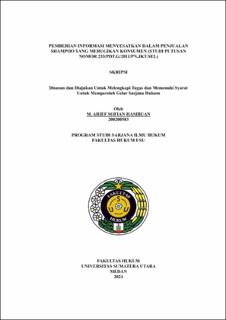Pemberian Informasi Menyesatkan dalam Penjualan Shampoo yang Merugikan Konsumen (Studi Putusan Nomor 233/PDT.G/2011/PN.JKT.SEL)
Provision of Misleading Information in the Sale of Shampoo that Harms Consumers (Study of Decision Number 233/PDT.G/2011/PN.JKT.SEL)

Date
2024Author
Hasibuan, M Arief Sofian
Advisor(s)
Harianto, Dedi
Mulhadi
Metadata
Show full item recordAbstract
Providing misleading information is a form of violation in trade practices that often harms consumers. Information that is inaccurate or deliberately conveyed incorrectly by business actors can influence consumers' decisions in purchasing a product, which ultimately has the potential to cause material and immaterial losses. This research refers to the South Jakarta District Court Decision Number 233/PDT.G/2011/PN.JKT.SEL as a case study in analyzing the phenomenon of providing misleading information, especially regarding shampoo products. This case was used as material for analysis to review legal aspects related to the obligations of business actors in providing correct and accurate information to consumers. This research aims to identify the criteria for misleading information, analyze the responsibilities of business actors, and evaluate judges' considerations in protecting consumers in Indonesia. The method used is normative juridical with a case study approach that examines consumer protection regulations and practices. where a statutory regulation approach and a case approach are used to examine consumer protection regulations and practices. The data used is secondary data consisting of primary legal materials, secondary legal materials and tertiary legal materials. The results of this research show that the Consumer Protection Law regarding misleading information in the sale of shampoo products with statements that do not match the product facts in the field, the responsibility of sellers for providing misleading information who have been proven to provide misleading information must be responsible for providing misleading information. includes the obligation to provide compensation to consumers who suffer losses. The judge's consideration in Decision Number 233/PDT.G/2011/PN.JKT.SEL shows that law enforcement against sellers who do not provide correct information is very important to protect consumers and prevent unfair trading practices.
Collections
- Undergraduate Theses [2698]
